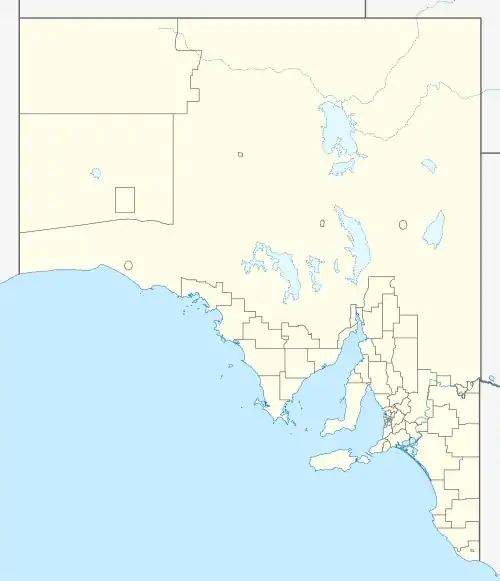Hundred of Alma
The Hundred of Alma is a cadastral unit of hundred located on the northern Adelaide Plains of South Australia spanning the township of Alma and the Alma Plains. The hundred was proclaimed in 1856 in the County of Gawler and named by Governor Richard Graves MacDonnell for the River Alma on the Crimean Peninsula, the location of the Battle of the Alma, the first Allied victory in the Crimean War.[1][2] The hundred is bounded on the north by the Wakefield River and on the south by the Light River
| Alma South Australia | |||||||||||||||
|---|---|---|---|---|---|---|---|---|---|---|---|---|---|---|---|
 Alma | |||||||||||||||
| Coordinates | 34.240°S 138.647°E | ||||||||||||||
| Established | 22 May 1856 | ||||||||||||||
| Area | 360 km2 (138 sq mi) | ||||||||||||||
| Region | Northern Adelaide Plains | ||||||||||||||
| County | Gawler | ||||||||||||||
| |||||||||||||||
The Hundred of Alma includes all of the localities of Alma, Salter Springs, Woolshed Flat and parts of the localities of Hamley Bridge, Stockyard Creek, Undalya, Rhynie, Riverton, Giles Corner, Stockport. The largest town is now Hamley Bridge near the southern boundary.[3]
.jpg.webp)
Local government
The District Council of Rhynie was the first local government body established within the hundred. It was proclaimed in October 1865 and included approximately the northern half of the hundred. Its establishment was closely followed by that of the District Council of Stockport just a month later. Stockport council covered approximately the southern half of the hundred as well as small parts of the Hundred of Gilbert and Hundred of Light easterly adjacent. The council area lay either side of the Gilbert River from Giles Corner in the north to the Gilbert's confluence with the River Light at Hamley Bridge in the south.[4][5]
Fifteen years on, in 1870, the District Council of Alma Plains was established by severing the western halves of Rhynie and Stockport councils. This meant that the hundred was roughly split in half, vertically, by the Gilbert River, with Alma Plains council administering the west and Rhynie and Stockport continuing to administer the east.[5]
In 1932 Alma Plains council was amalgamated with the westerly adjacent District Council of Dalkey to create the new District Council of Owen. In the same year the Stockport and Rhynie councils amalgamated with the District Council of Gilbert to their east to create the new District Council of Riverton. From this time local governance of the hundred was thus split between Owen in the west and Riverton in the east.[5]
In 1983, Owen council became a part of the District Council of Wakefield Plains. Then in 1997, Wakefield Plains council itself became a part of the much larger Wakefield Regional Council. On the same day in 1997, Riverton council became a part of the much larger District Council of Clare and Gilbert Valleys, leaving local governance of the hundred still split down the middle with Wakefield in the west and Clare and Gilbert Valleys in the east.
References
- "Placename Details: Hundred of Alma". Property Location Browser. Government of South Australia. 29 January 2009. SA0001003. Archived from the original on 7 December 2015. Retrieved 6 November 2017.
Derivation of Name: A battle in the Crimean War; Other Details: Area 138 square miles. The Wakefield River forms the northern boundary of the Hundred.
- Manning, Geoffrey. "Alma" (PDF). Manning Index of South Austrlalian History - Place Names of South Australia. Retrieved 6 November 2017 – via State Library of South Australia.
The first surveys of the Hundred of Alma were made by James Elder in 1855 and it was proclaimed on 22 May 1856 during the vice-regal term of Sir Richard MacDonnell who, no doubt, dubbed it so because, on the banks of the River Alma in the Crimea, the allies gained their first victory in 1854; the name comes from a Tartar word meaning 'apple tree'.
- "Hundreds, Suburbs and Localities". LocationSA Map Viewer. Retrieved 4 December 2020.
- "District of Stockport" (PDF). South Australian Government Gazette (50 ed.). Government of South Australia. 1865: 1069-1070. 23 November 1865. Retrieved 22 September 2017.
- Marsden, Susan (2012). "A History of South Australian Councils to 1936" (PDF). Local Government Association of South Australia. Retrieved 6 November 2017.